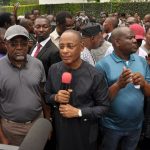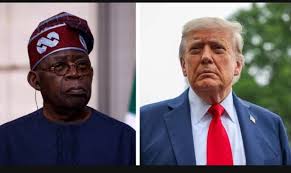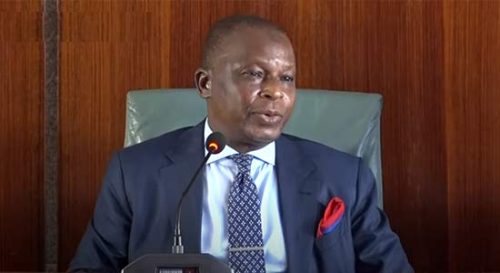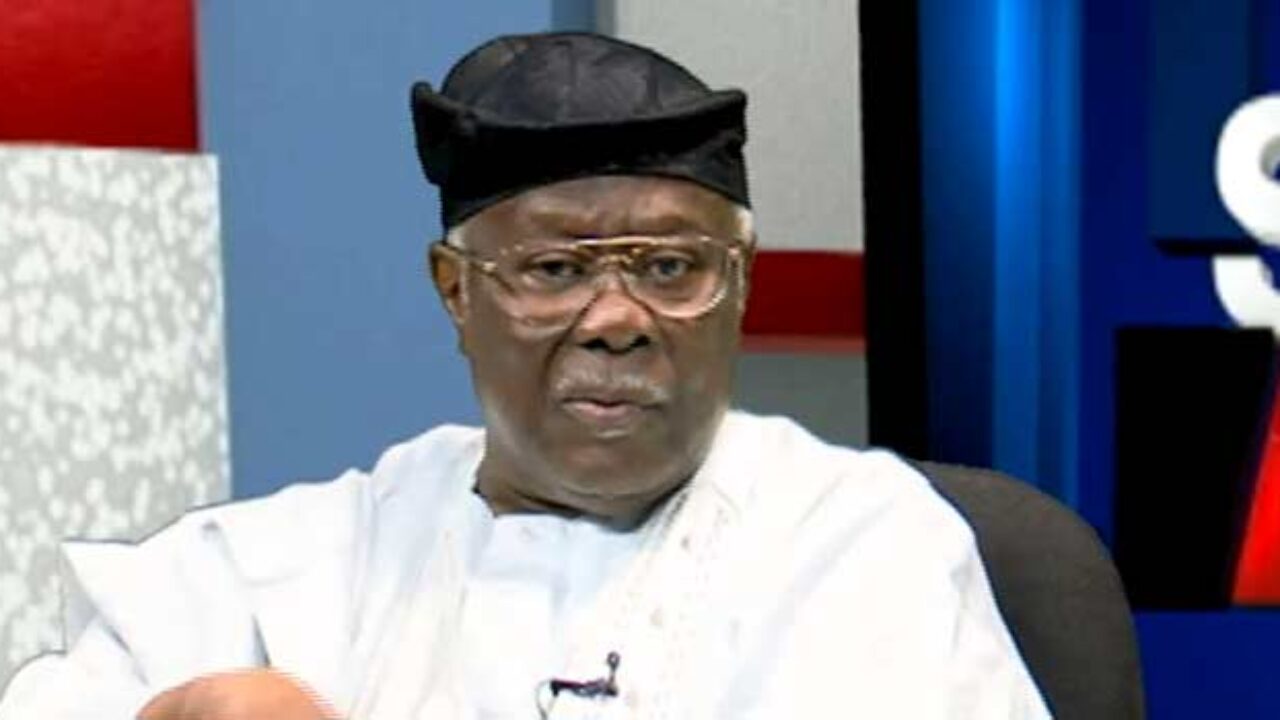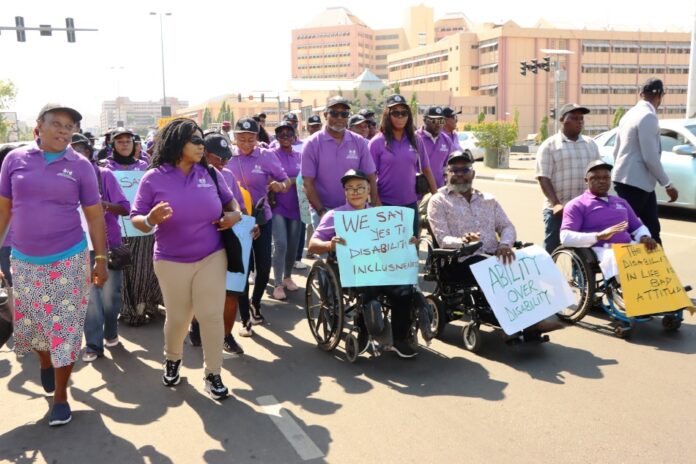Counting gains and losses after Rivers stormy polls
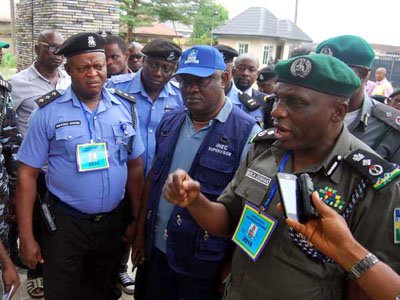
There is no doubt that the December 10 National and State Assembly re-run and supplementary elections in Rivers State caused considerable and palpable tension in the oil-rich state.
The drums of war and threats of violence drowned the political frills and jingles that usually accompanied electoral campaigns. Rather than shout political slogans and propagate programmes of action, the gladiators stoked the embers of hate and sowed the seeds of destruction.
What was at stake did not go beyond three seats in the Senate, eight Federal House of Assembly and 10 in the Rivers State House of Assembly. The seats became available for contest, following court rulings that invalidated the 2015 federal and state legislative elections in the state.
The theatres for the electoral contest were the Rivers South-East, Rivers East and Rivers West Senatorial Districts. The eight federal constituencies in which elections took place were Akuku-Toru/Asari Toru; Degema/Bonny; Okrika/Ogu-Bolo; Etche/Omuma; Ikwere/Emohua; Khana Gokana; Eleme/Tai/Oyigbo and Opobo/Nkoro/Andoni. While the state constituencies were Eleme, Gokana, Asari-Toru I, Asari-Toru II, Andoni, Khana II, Etche II, Ikwere, Bonny and Degema.
The Independent National Electoral Commission, INEC, had conducted re-run polls on March 19, 2016. But the exercise was marred by violence mainly between armed supporters of Peoples Democratic Party, PDP, and those of the All Progressives Congress, APC; forcing the electoral body to suspend the polls.
The unpleasant experience of March 19 forced INEC to be wary and circumspect in announcing another date for the controversial polls. In fact, the hands of the electoral umpire were forced by the Senate resolution that put a time limit to the suspended polls.
Now, December 10 has come and gone. Although hell was not let loose as feared by many doomsday analysts, the acrimony generated before and during the polls is still intense. The bad blood still flows and the toxic pronouncements still pollutes the political atmosphere.
Reports of what transpired during the elections confirmed that the fears of possible violence were not misplaced. Indeed, but for the suffocating presence of security forces in the state, there could have been more sad stories to tell.
A Civil Society Organisation, the CLEEN Foundation, which monitored the elections, reported that they were generally “marred by irregularities, large scale violence, professional misconducts and open bias by security operatives and electoral personnel.”
The group blamed the Police, Army, and the State Security Service for showing bias in multiple cases of violence and malpractices that characterised the exercise.
The report stated: “There were serious cases of electoral violence orchestrated by the Police, Army and DSS in Ward 3 Bodo community in Gokana and Khana Local Government areas. This led to the shooting and killing of Mr. Mbari John MeeBari.
“At Ward 12, Unit 5, Abonnema, Akuku Toru, Police shot sporadically to scarce away voters. At Sara 1, Sara 2 and Kalakama (Ward 12), Okirika LGA electoral materials were hijacked by the Army and officers of SARS at gunpoint, the report noted.
The group blamed the killing of a police officer, Alkali Mohammed, a deputy superintendent of police, and his orderly, on “unwarranted use of force and shooting”. Mr. Mohammed was beheaded in an ambush at Omoku, Ogba/Ndoni/Egbema LGA.
CLEEN lamented failure of the military and other security agencies to maintain neutrality towards the political parties.
The group asked President Muhammadu Buhari, the Inspector General of Police and INEC to launch investigations into the conduct of military personnel and police officers deployed for the Rivers polls, and “bring those found guilty of professional misconduct to book.”
The Nigeria Civil Society Situation Room also issued a report evaluating the Rivers re-run elections. The Situation Room is made up of Civil Society Organisations (CSOs) working in support of credible and transparent elections in Nigeria and includes such groups as Policy and Legal Advocacy Centre (PLAC), CLEEN Foundation, Action Aid Nigeria, among others.
According to the CSO’s report, polling started late in all of the areas they observed with the earliest reported starting times being 10.30am, with other locations reporting a start significantly later (Gbe, Gokana 1.40pm). “Delays were so severe in parts of Khana and Eleme we were unable to confirm if voting started at all. Interviews with voters in Khana Ward 3 (Lleuku/Nyokoro) reported that materials and staff never arrived in Lleuku and Nyokoro.
“The delays and lack of public information on the situation added to an already tense and difficult situation, in some cases leading to the abandonment of the poll (as in Gbe, Gokana). Although disputes with political parties during the early stages of distribution were an obvious factor, Rivers State voters deserve a better explanation as to why their state again ran 24 hours behind all other states on the start of materials distribution and why remedial measures were inadequate.”
The CSOs noted that the violent disruption of voting and collation in the areas they observed had put a question mark on the credibility of results from those areas, adding that it highlighted the issue of neutrality or lack of it from the security forces and election officials.
The observers wondered how INEC arrived at a conclusion that the December 10 polls were successful. It said that a failure to acknowledge the serious issues in the polls and the impact on collation would call INEC’s own credibility into question.
As if unfazed by criticisms, INEC described the conduct of the re-run legislative elections in Rivers as an improvement compared to the suspended exercise in March.
The Chief Press Secretary to INEC Chairman, Mr Rotimi Oyekanmi, said in an interview with the News Agency of Nigeria, NAN, in Abuja that though there were few cases of violence during the election, there was no confirmed case of killing.
Perhaps, he said that before reports confirmed the gruesome murder of two policemen: Alkali Mohammed, a Deputy Superintendent of Police (DSP) of Mobile Police Unit 48, and his orderly in Ujju community near Omoku in Ogba/Edema/Ndoni council area.
In spite of this ugly incident and other isolated cases, the INEC spokesman declared: “Generally, the trail of violent is not as what we witnessed in March.
“In March, a person was killed and the commission was forced to close the election, but in this Saturday exercise, there is no strong indication for us to say that we are suspending the election again.
“We think that relatively, we should be able to conclude the process peacefully, the security agencies should be commended for securing most of the places used for the elections.
“We are assuring Nigerians that we are building on our achievements in Edo and Ondo in terms of credibility of elections in the country.”
The chief press secretary further said that there were measures put in place to ensure that collation of results remained peaceful and transparent. “A lot of precautionary measures have been put in place to ensure that hijacking of election results witnessed in the suspended elections in March does not reoccur,’’ he said.
INEC’s position was apparently at variance with the situation on ground in Rivers State. The PDP chairman in Rivers, Bro. Felix Obuah, challenged INEC to show how it conducted elections in the whole of the Rivers South East Senatorial District.
Obuah explained that what happened on Saturday, December 10 was nothing short of war declared on the people of the Rivers South East by the APC, Army, SARS, Policemen and thugs dressed in army uniform.
The State PDP Chairman further added that what happened on the Saturday Re-run Election was like scenes from a classical movie where military might was brazenly deployed to over-run a hapless and defenceless people.
The PDP Chairman stated that the party having reviewed the entire exercise last Saturday came to the conclusion that there was no election in Khana LGA, calling on INEC to cancel the re-run elections in the LGA as it has been marred by irregularities and orchestrated violence by the APC against members of the PDP.
However, the security agencies have maintained that they acted from a position of neutrality. The Nigerian Army denied allegations of favouritism in the elections in Rivers, insisting that the troops only acted to prevent security breaches.
Gen Kasimu Abdulkarim, General Officer Commanding of the 6 division of the Army, insisted that those behind the reports of partisanship were bent on tarnishing the image of the army, revealing that the soldiers rescued 16 abducted National Youth Service Corps, NYSC, members and some policemen who were ambushed.
“They acted swiftly in response to security breaches in order to enforce the law, provide aid to the police and other security agencies especially in areas like Abonema, Etche, Gokhana, Ikwere, Eleme, Tai, Khana and Omoku amongst others,” Abdulkarim said in a statement.
“Susceptibility of mentioned areas warranted providing security for the electoral officials, voters, international and local observers, in conjunction with other security agencies by soldiers for a peaceful election to thrive in the environment.
“In Gokhana, armed hoodlums engaged the soldiers providing outer perimeter defence for the electorate.
“In Abonema there were three explosions that created bedlam. Subsequently, 11 NYSC members were abducted along with electoral materials. However, 10 of them were rescued two hours later by the soldiers while one was rescued about eight hours later.
“At Emouha five NYSC members were abducted with election materials in a Siena bus. The corps members were rescued while the suspect was handed over to the police.
“Several shooting were recorded in some communities such as Bodo, the home town of the secretary to the state government, and Mogho in Gokhana local government area, including snatching of ballot boxes.
“The most brutal incidence occurred at Ujju Community near Omoku in Onelga where police patrol team was ambushed. In the ambush, 10 policemen scampered into the bush. These attacks are reasonable evidence of violations of breach of law and order which portray the area as a flash point.
“In spite this barbarism, soldiers acted with civility and professionalism in guaranteeing peaceful election.
He lamented that some people erroneously accused soldiers of ballot box snatching, illegal escorts of some politicians, arrest and detention of voters during the general conduct of the elections.
According to him, “the weighty nature of these allegations could cause members of the public to view soldiers negatively, hence the need to adequately inform the general public on the true perspective. The public thus need to consider them as mere farce to garner public sympathy.”
But the “weighty” allegations were not just coming from inconsequential people. The governor of the state, Nyesom Wike, was unrelenting in his accusations and castigation of the security forces.
Before INEC returned George Sekibo, as the winner of Rivers East senatorial district on Monday, Wike led other prominent members of the PDP to confront security operatives at the Port Harcourt City Council Hall.
The governor mobilised his party members to the venue of the collation centre to demand declaration of the result. The people defied security operatives who were said to be shooting sporadically.
Addressing his supporters at the Government House, after the confrontation, Wike commended Rivers people for standing up in defence of democracy and the interest of Rivers State.
He praised the people for their courage in the face of invading security agencies whom he accused of killing, maiming and stealing ballot boxes in their bid to subvert the will of the people.
He said: “What has happened today will not happen in 2019. Now they have told us what to expect. They will see that we will also be prepared. This will not happen again.
“I have told the security agencies, you come and collect security money from me and use it against Rivers people. Enough is enough. They will now be depending on NDDC for their funding. Let me see where it will take them to”.
The governor added: “Rivers people must work as brothers and sisters and defend our interests. We don’t have Police, we don’t have army, but we have God. And so, we must put our house in order and be our own police, be our own Army.
“We have no confidence in the Army, we have no confidence in the police and we have no confidence in the SSS. They have shown that there is no democracy in Nigeria. “




